
In northern Tanzania lives a village of farmers and livestock breeders who used to keep one eye on their grazing animals and the other skyward — watching for rain. Today, they are focusing downward, feet planted firmly on rich soil, reworking their lives shovel by shovel.
start with an unpredictable climate.
Add a portion of destructive cultural values. Stir in some fear. The result: a recipe for ruin. “Some Tanzanians are burdened with harmful belief systems,” says Tim Andrews, World Vision's national director in Tanzania, “a culture steeped in a socialist past, ancestor worship, fear of witchcraft, and corruption.” The consequences are soul crushing, he says. Poverty robs people of their worth. And then you have the rain — too much, too little, or at the wrong time. But with help from an innovative program called Securing Africa’s Future, World Vision has figured out how to reverse the course, leading entire communities of hardworking, God-gifted people from dependence to dignity.
How it Works

Conservation Agriculture
Farmers recognize that God is empowering them to transform their communities, so they learn to be good stewards of their land by rotating crops, actively managing soil fertility, vigorously harvesting water, avoiding toxic chemicals, and more.
Disaster Preparedness
Farmers employ early warning systems to anticipate and respond to potential threats such as flood, drought, food shortages, fluctuating prices, pests, and disease.
Managing Creation’s Natural Resources
Farmers work together to manage community natural resources like forests, pastures, and watersheds. These provide not only needed fuel and food, but also the water, bees, and birds the farm needs to increase crops, pollination, and insect control.
Increased Profits
As farmers learn to enrich soil, improve plant quality, ensure access to water, and manage microloans, they reduce loss, increase harvests, have better access to markets, and grow income.
Savings Groups
Savings provide families with a cushion against emergencies and a means to meet household needs or grow a business. Group members regularly deposit money in a shared savings box, take out and repay loans as needed, and contribute to a fund that helps community members in need.
Teamwork
Farmers organize into producer groups, working together to connect with suppliers, buyers, transportation, technology, cooperative storage, and more.
A Rice Field Epiphany
Doing things differently is the hallmark of Securing Africa’s Future, developed by Tim and a host of visionary teammates. A 25-year veteran of World Vision, Tim, 55, has been national director of the organization’s office in Tanzania for four years. In his first five months on the job, he was determined to visit every project in the country, spending a total of just two hours at his desk in that time.
It was in 2010, while standing in a rice paddy in Makindube village with a farmer, that Tim had an epiphany. The farmer’s harvest was good, but she was dejected. “She’d lost 40 percent of her harvest due to poor storage, was offered only low prices by middlemen, and couldn’t afford school fees for her children,” says Tim. “Worst of all, they were malnourished. She couldn’t afford protein for their diet. She knew that rice traders would take advantage of her as a solo farmer once again.”
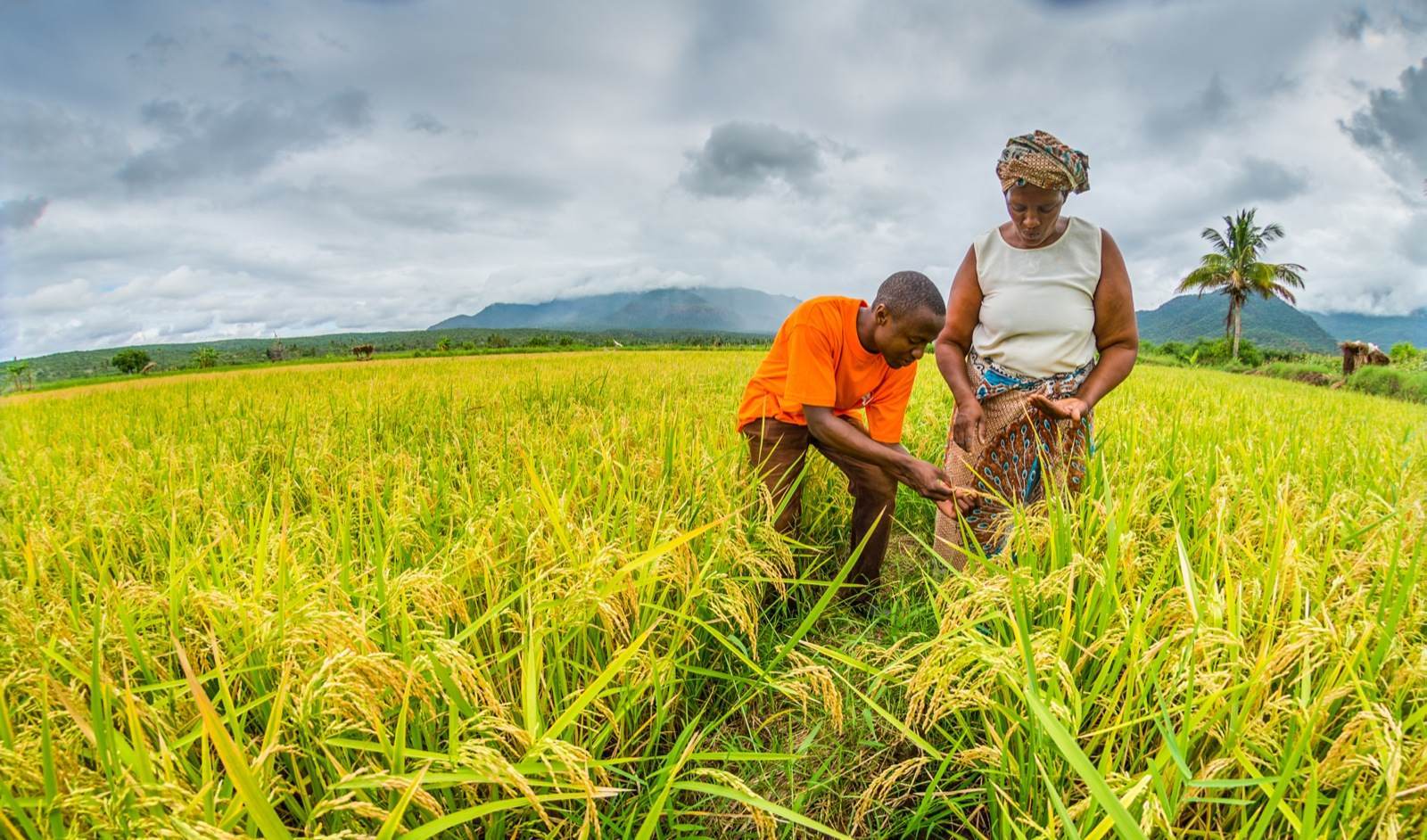
World Vision’s Elibariki Mmary and farmer Nagenjwa Naffai examine one of the secrets to Securing Africa’s Future’s success: SARO 5 rice.
Makindube has a large irrigation system and fairly predictable weather. Farming should be profitable. “I’m standing in the Garden of Eden,” Tim thought, “and the devil is still in control.” To wrest control from the devil would take a strategy based on experience, innovation, and prayer.
“I prayed with and listened to a multitude of wise counselors,” says Tim. “World Vision global, regional, and local leaders, external consultants, and — profoundly so — the community members themselves.” Securing Africa’s Future was born.
“By far, the most important thing we do is facilitate a mindset shift from dependency to a biblically empowered worldview,” says Tim. “A biblically empowered worldview understands that God is sovereign, not the state, not the nongovernmental organizations, not the spirits, not fate, not even fear itself. Individuals matter.”
Empowering God’s People
Helping people believe they matter is one of the primary components of Securing Africa’s Future. For Mrindwa Manento, 46, World Vision’s training on empowerment and spiritual transformation changed his life. “We have dependency syndrome,” he says. “We depend on Europeans and Americans.”
After independence from Britain in 1961, Tanzania became a socialist nation. The government forced farmers to move into Soviet-style farming collectives, fostering bitterness, low morale, and, ultimately, failure.
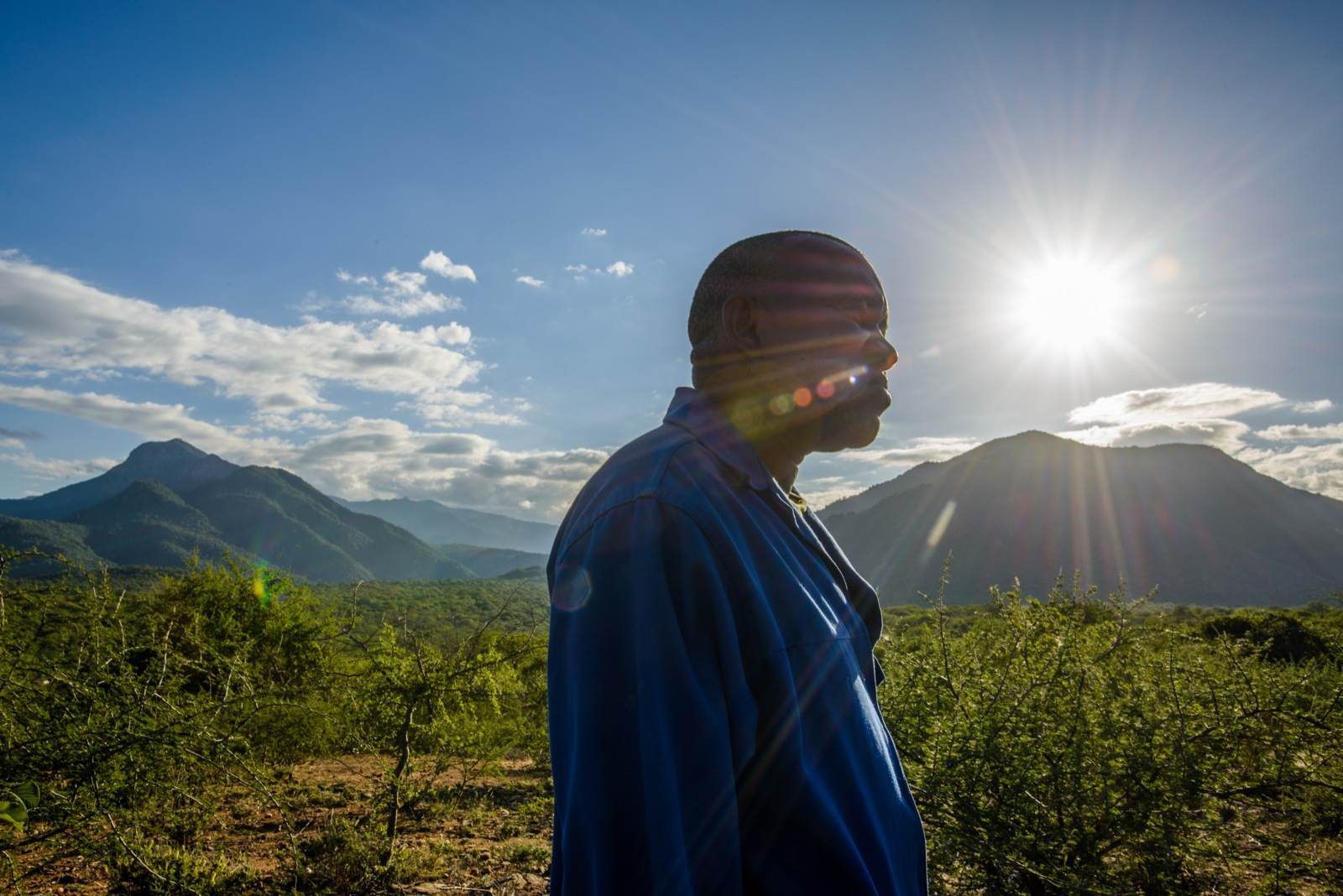
With a new life as a father and a farmer, Mrindwa Manento contemplates the land he now works to protect.
Through Securing Africa’s Future, Mrindwa learned that each person has value where they are. “God loves us,” he says. “He gave us our legs, our land, our minerals, and our wildlife. Because of the training, I am organizing myself to use my brain to help myself and help the community.”
Participating in a World Vision course called Celebrating Families, a faith-based curriculum for parents, Mrindwa found peace as a father. “Celebrating Families transformed my life,” he says. “I was, before, like a lion. My wife would run. My children would hide. Now I am a friend to my family.”
Instead of working on their own, they now work together to access better seeds and fertilizers and move their products to market. Today, farmers are learning to plant properly instead of relying on traditional methods that didn’t always work.
Tim and his team reached out to partners to support the farmers. Farm Concern International, an organization that supports farmers in Africa, helped organize farmers into groups. VisionFund, World Vision’s microfinance agency, provided credit for farmers to buy better seeds, including SARO 5, a rice variety with a higher yield that smells and tastes better than its competitors’ rice. World Vision also contracted with MicroEnsure, an organization specializing in providing insurance to small farms in case bad weather destroyed their crops.
Like the woman Tim met in the field in 2010, other Makindube farmers struggled to profit from their hard labor. Greedy brokers would take advantage of farmers who had no way to store their harvest, so they had to sell their rice at a low price.
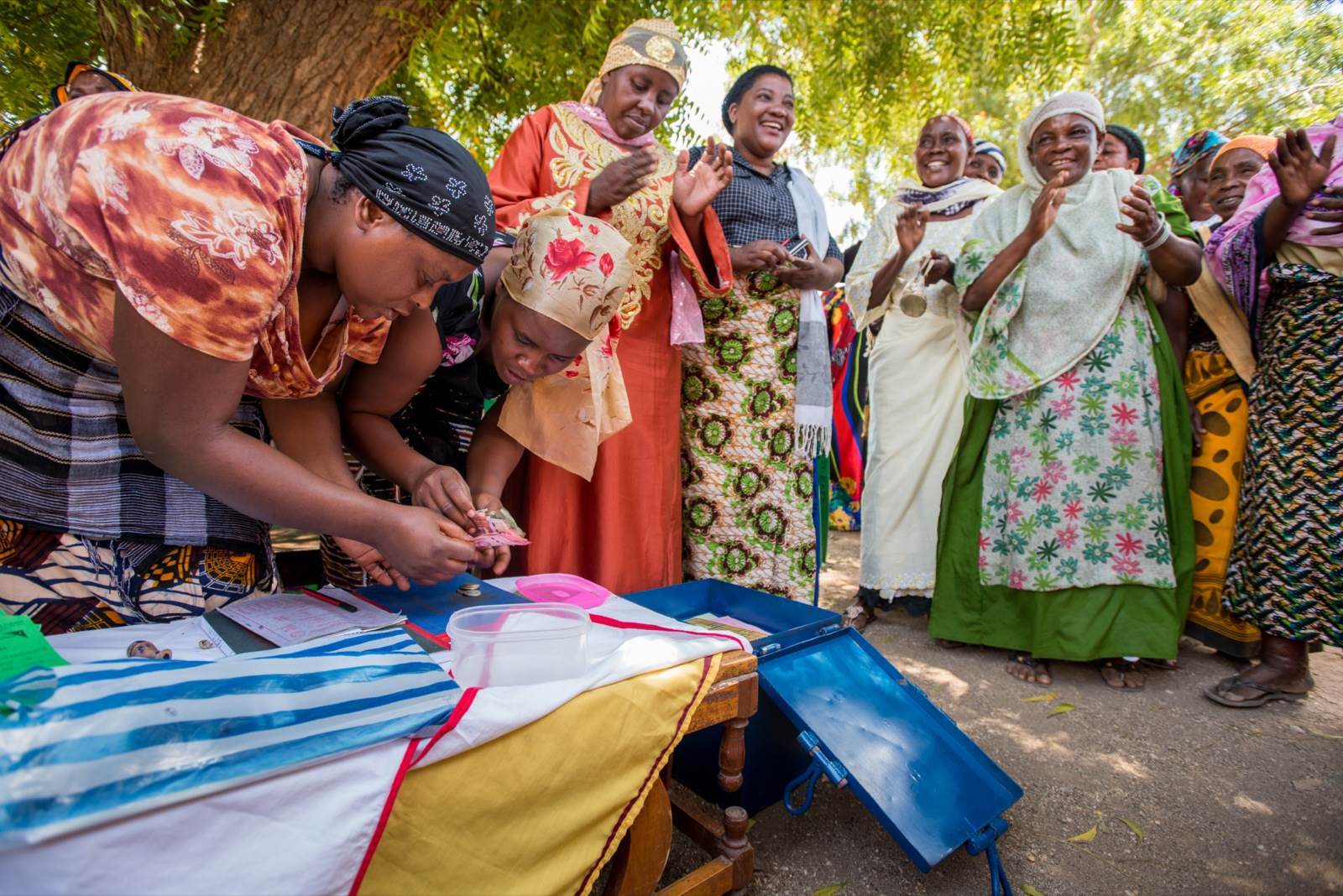
Counting their blessings and their savings — an all female savings group banks weekly under a tree in Makindube .
Now farmers are protected from those brokers. Their small groups feed into bigger groups called commercial villages, which act as a legislature for the groups. The commercial village ensures that farmer groups have access to storage systems for their products. When farmers are able to store their rice, maize, or other crops, they can decide when they want to sell it, instead of having to sell it all at one time at a lower price.
“Our target is to eliminate 100 percent of those greedy middlemen,” says Makalius Charles, who runs Securing Africa’s Future in Makindube. Makalius says they’ve shut down about 80 percent of the problem.
Farmers now plant the same amount of seed but get bigger harvests. They meet regularly as groups to discuss marketing, pricing, farming techniques, and technology. Makindube has 179 such groups, with 6,700 members. And as a rising tide lifts all boats, more than 4,000 local farmers who aren’t involved directly in Securing Africa’s Future also benefit.
“Many more buyers came to the community than previous years,” Tim says, adding that higher demand helped increase farmers’ income.
Protecting Each Other
World Vision encourages each group to save their money, providing these small, powerhouse farming teams with savings opportunities they never had before. Members purchase shares with their earnings to borrow against when they have medical bills or need to buy school supplies for their children — decisions that are family-focused.
Before a group member can buy a share, he or she must contribute 500 Tanzanian shillings, or 30 cents, to a social fund. It all adds up. When a group member has an emergency, a sick child, or an unexpected need, they can draw from the social fund at no interest.
The savings groups offer another benefit: growth in financial literacy. As group members develop financial acumen, they can take advantage of low-interest loans from VisionFund of Tanzania.
These improvements are good for people and good for the environment. Mrindwa chairs a natural resources committee in Makindube. In his lifetime, he has seen environmental change. “This was a forest,” he says, pointing at the nearby hills, “but now the forest is far away. There used to be lions and leopards here. They left.”
People in the village cut trees nearby to make charcoal for fuel, until Mrindwa’s group declared a cutting-free zone and levied fines on abusers. Community members planted ficus trees to preserve the land from wind and water erosion and installed energy-efficient stoves that use coconut husks for fuel instead of charcoal.
Organic farming is a key ingredient in the farmers’ success. Growers are cultivating virgin land and learning to make their own compost from natural materials. Some are now harvesting four times the rice they produced previously. Soon, these organic vegetables will be shipped to foreign markets.
“Tanzania offers unique opportunities for small-scale farmers to compete in today’s global markets with high quality organically grown food,” says Larry Jacobs, who directs another Securing Africa’s Future innovation, the Great African Food Co.
Securing Africa’s Future is a success in Makindube. In the first year, the program raised the income of 5,095 farmers from $7.8 million to $18.9 million. Tim Andrews says that in the future, this extra income could truly change the landscape.
“What if we could support these communities to develop mechanisms so they could tax themselves on 10 to 20 percent of their incremental income?” he asks. “Can you imagine? On $11 million, that’s $1 million or $2 million a year. With that sort of tax base, there is no reason at all why those villages couldn’t have the best schools, healthcare, and road systems in the country.”
There have been bumps along the way. The year after Makindube’s watershed success, the area experienced both drought and floods. At the same time, the government decided to import rice that competed with farmers in Makindube. Despite the setbacks, enthusiasm for Securing Africa’s Future in Makindube is over the moon. The farmers now know what success looks like, what it takes to get there, and that they are in control.
The Next Makindube
Could Securing Africa’s Future be effective in a place without a ready supply of water, where culture devalued women, and where farmers counted on luck for a good harvest? The World Vision team went to Mbuyuni village — seven hours by car from Makindube — in northern Tanzania to find out.
Aloisi Lomayani, 46, has always lived in Mbuyuni. It’s where he met his wife, Naini, 34. The couple has six children, a cat, and two dogs named Simba and Kali. Simba means lion in Swahili, while Kali means fierce — ferocious names for two happy, tail-wagging mutts.
The family on 200 acres in a house made of cow dung. But in this last farming season, they planted only 50 acres and harvested a mere six bags of beans and grain. It was just too dry.
“We had given up. We were living in a hopeless situation,” says Aloisi. “Our crops, our cows, our goats are our bank. With good harvests, we have money to send our children to school. Without our crops, our cows, and our goats, we cannot send them to school. Weather is constantly on my mind.”

Dry, windy Mbuyuni village lacks the water supply of Makindube, but farmers are creating water pans to combat nature.
When it rains, the family springs into action. “We run to the farm. We start planting. It doesn’t matter if it isn’t completely prepared. We just start putting in seeds,” says Naini. “Even Esther goes. She mostly just gives us instructions, though.” Esther is only 4.
“The rains used to come from the end of October through January,” says Aloisi. “Now, everything has changed. Changes in climate not only cause problems for farmers, but for cattle keepers. If there is no rain, we have no crops and nothing to feed our animals.”
The Road to Yatta
In August 2013, World Vision staff invited 51 Mbuyuni villagers to travel by bus eight hours north to Yatta, Kenya, for training. Only four of the villagers had ever been out of the country. As they left Mbuyuni, they burst into song.
“When we were driving, we passed an area with big trees,” says Martha Melame, 33. The bus became abuzz with dialogue: “If we had those big trees, we would have cut them down for charcoal.” There was livestock — but it wasn’t roaming freely. “We saw cows in a pen,” she says. “They weren’t eating the neighbor’s grass. They looked good, compared to our cows.”
Chickens in Yatta were kept in chicken coops — a novel idea. “We don’t keep our chickens in a coop, and the eagles take them away,” Martha says.
Then they saw the water pans. About five years ago, Bishop Titus Masika of the Anglican Church of Kenya convinced the people of Yatta that if they dug water pans, they could capture rain and create a consistent water supply for their crops. Tim had heard about the Bishop’s work.
“Yatta just blows your socks off,” says Tim. “This was a community that could not afford to buy a matchbox. People would wake up in the morning, look for where the smoke was rising, and walk to borrow a bit of coal from whoever had fire.”
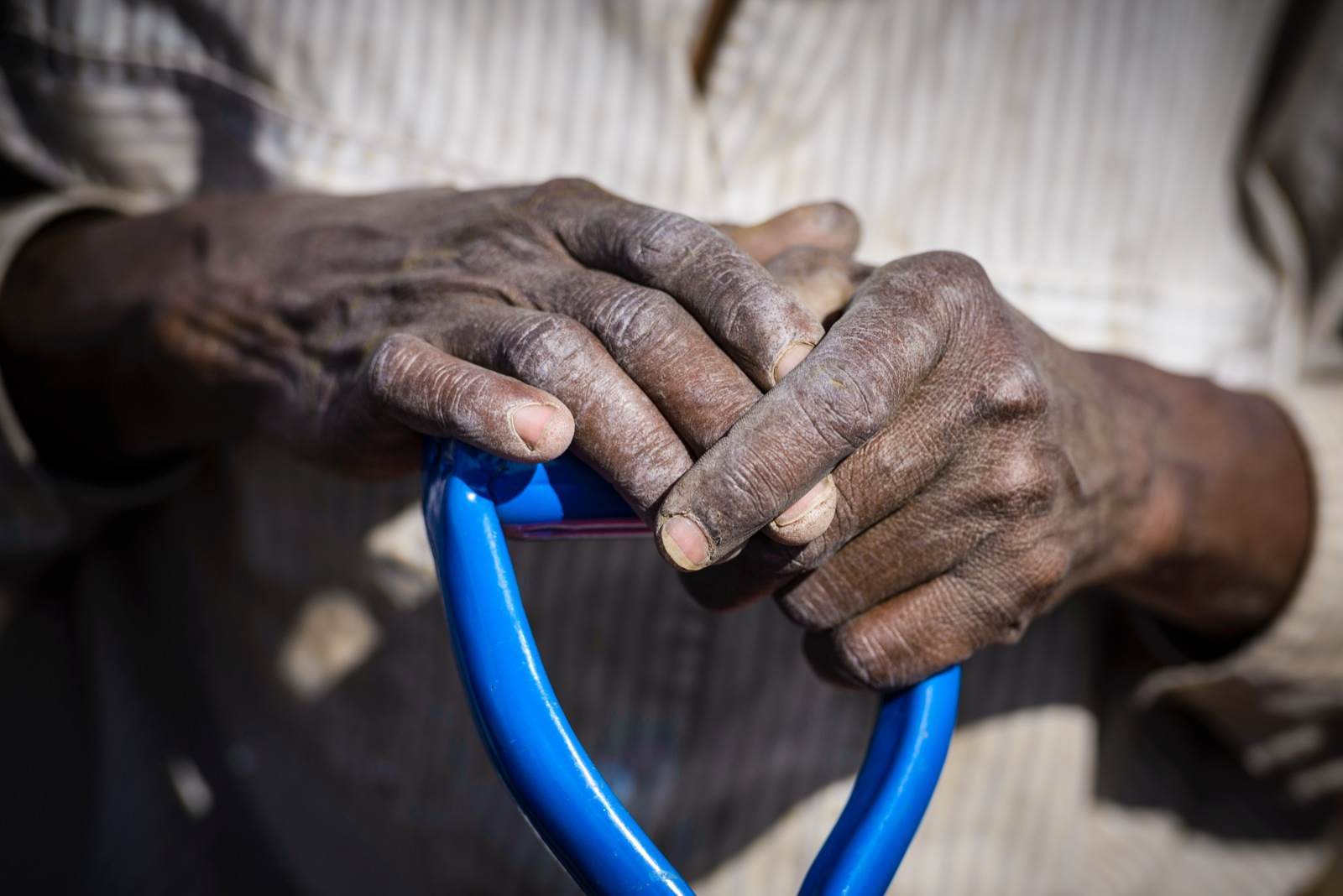
Today, Yatta’s dry land is fruitful, but Bishop Masika’s initiative transformed more than the land. He also began challenging old mindsets and encouraging people to believe they had potential.
The Mbuyuni farmers returned from Yatta with a new vision, and they began digging up a storm — 120 water pans are underway. As in Makindube, they are forming small, powerful groups — 27 so far — that will help them grow and sell their vegetables, save for their children’s future, and support one another. Their work has inspired their neighbors to dig their own pans. One mother of seven even began digging a water pan with her bare hands.
Similar scenes of transformation will play out all over Tanzania and across Africa as World Vision rolls out Securing Africa’s Future in rural contexts in East, West, and Southern Africa to help families cope with poverty, drought, and external shocks.
Aloisi and his family are constructing a giant water pan — perhaps the biggest in the area.
“My children will have a better life,” says Aloisi, “They will not have a life by bahatisha,” the Swahili word for luck.
“My father loves this project,” says daughter Jenipha, 15. “The extra money we get will be used to buy more seeds and to pay for our education. My father won’t have to sell a cow now.”
For Aloisi’s wife, Naini, good crops will no longer come through luck. “Now I am assured that if I plant, even with no rain, I will water my beans until they come up,” she says. “This is the first time I’ve felt this in all of my life.” Now empowered, Naini heads one of the community’s savings groups.
Aloisi, a committed Roman Catholic, is reverent when speaking about the turn of events in Mbuyuni. “Myself and the community received this training as salvation,” he says.

Martha Melame, 33, an Mbuyuni farmer, now has a big goal for her children: to take them to a Tanzanian game park to see wildlife.
Frida Transformed
Aloisi’s neighbor, Frida Peter, 34, trained in Yatta as well. Once that bus pulled back into Mbuyuni village, she quickly convinced her husband that digging a water pan was a worthwhile project.
“Who will help us?” he asked her. “Is there assistance we can be given?” Frida responded: “No. It is you. You will be taught to do it. If possible, you’ll get some tools. It is time to quit being dependent. It is time to just do it.” Frida’s husband started digging.
Frida then took on the chicken problem, reaching out to her neighbors. “I told them, ‘Why do you keep your chickens roaming around? If we put them together and take care of them, we can grow even more.’” She gathered a group of six women and two men and they built a chicken coop — everyone bringing what they had. The coop is a patchwork of chicken wires and mismatched wood, but it is solid and will hold plenty of hens. Now the group is saving money to buy chickens.
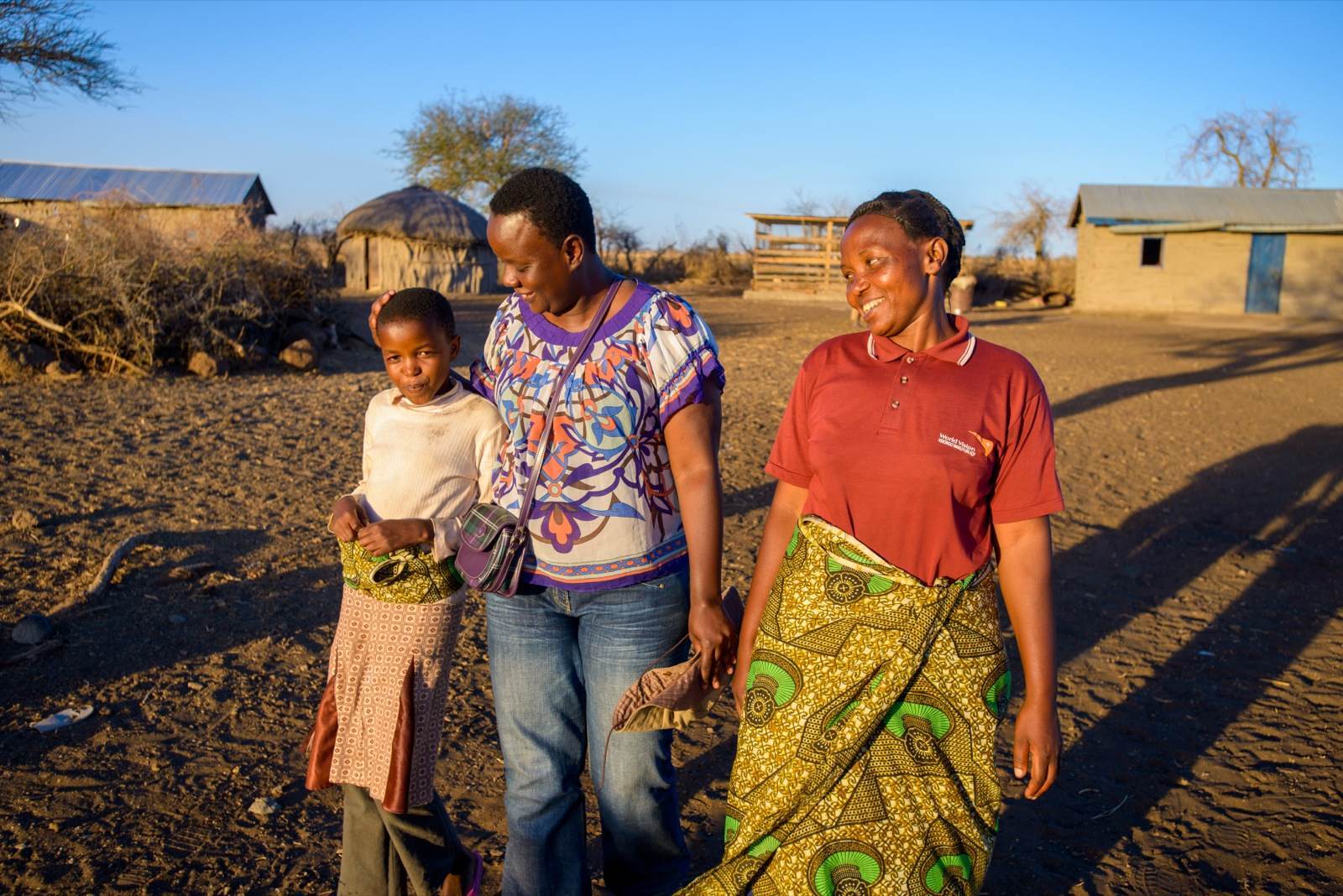
Frida Peter, in red, with daughter Belinda, left, is advised on farming and finances by World Vision’s Pamela Shao, who manages Securing Africa’s Future in Mbuyuni.
In Yatta, Frida learned one-acre farming techniques — dividing land into one-acre plots and farming crops for use at home and for profit. Each crop ripens at a different time, so farmers always have a harvest. She’ll grow onions, tomatoes, sweet potatoes, maize, and lablab beans to sell. Soon the family will harvest vegetables they’ve never eaten. “I want to try something called salad,” says daughter Belinda, 12.
Frida is driven, but she begins every day in the quiet of the morning in prayer. “I pray for the day,” she says. “For the blessings of the Lord. To lead me. To guide me. To protect me.”
Because of Securing Africa’s Future, people like Frida know that even in a place with little rain, a culture of dependence, and social mores that hold back progress, anything is possible through planning, persistence, and prayer — when you know you are God’s beloved.

